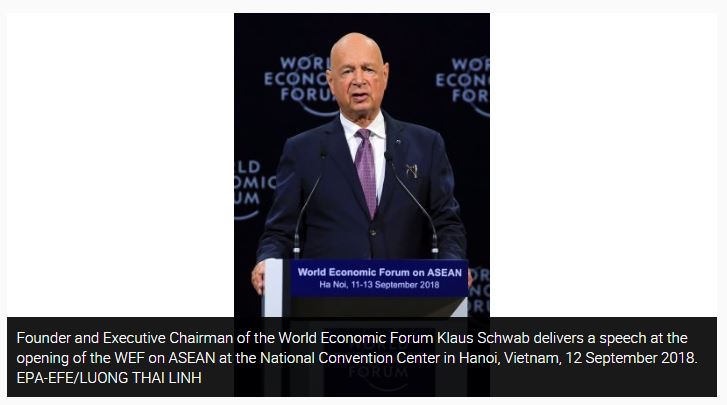Asean states must be prepared for a ‘fast-changing industrial revolution’
The Fourth Industrial Revolution, or Industry 4.0, has posed both opportunities and challenges to Asean. Klaus Schwab, founder and executive chairman of the World Economic Forum, speaks to Viet Nam News about the pressures of the ongoing technological and scientific revolution.
CAN YOU EXPLAIN MORE ABOUT THE REVOLUTION? WHY DO YOU CALL IT THE FOURTH INDUSTRIAL REVOLUTION? FACING THE EVOLUTION OF SCIENCE AND TECHNOLOGIES AS WELL AS THE RISE OF INDUSTRY 4.0, HOW HAS THE WORLD’S ECONOMY CHANGED?
If we look back, we had the first industrial revolution when the steam engine was created, it changed everything, created locomotives, steam boats and so on. Then we had the second industrial revolution when we invented electricity, created mass production and the world became much more industrialised. We had the third industrial revolution with the invention of computer and the world started to become digitalised.
Now we have the Fourth Industrial Revolution and it’s not related to one specific product. Now we have robots, self-driving cars, drones, blockchain. So the Fourth Industrial Revolution is different because it’s composed of many different patterns, many different technologies. And the Fourth Industrial Revolution comes much faster – we have less time to prepare ourselves compared to the last revolution.
We see the changes in the world’s economy caused by the Fourth Industrial Revolution are now unfolding. Just think of the companies which are the most-valued like Amazon, Google – the companies of the Fourth Industrial Revolution – have only been around for 20 years. So it demonstrates the speed of the Fourth Industrial Revolution. We’ll see, of course, much bigger impacts in the future. So the changes are just enormous.
If we look at the pressures, we have to deal with many challenges. The WEF is an organisation that helps governments, businesses and civil society work together to be aware of future developments and to prepare in time for social challenges. We had multiple platforms in the past and have achieved in many areas. The governments, businesses and civil society have formulated the right policies to address such challenges.
THE FOURTH INDUSTRIAL REVOLUTION IS EXPECTED TO BRING A LOT OF OPPORTUNITIES TO ASEAN COUNTRIES. WHAT DO YOU THINK ABOUT THEIR PROSPECTS? WHAT IS THE ROLE OF THE GOVERNMENTS AND WHAT CAN THEY DO TO BENEFIT THE MOST FROM THE REVOLUTION?
I think Asean countries have a great opportunity to use the Fourth Industrial Revolution to serve their countries. It’s the young generation that is eager to learn, is an entrepreneurial generation and an innovative generation. So I’m really optimistic about Aseancountries and Vietnam to play a major part in shaping the Fourth Industrial Revolution.
What is really important is to create opportunities for entrepreneurs and make sure that we have an ecosystem, which is favourable to innovation. Asean countries have to create 10,000 jobs everyday. So the traditional pattern of manufacturing will change very much in the Fourth Industrial Revolution because we’ll see robots take over some work which is now done manually. We’ll have robots also replace some of our thinking works. So we have to think very much what will be the jobs of the future.
It is also matter of education and flexibility. So, if the necessary policies are put into place, I think Asean countries have a good future, but there’s strong competition, particularly from the United States, China – who have recognised the importance of the Fourth Industrial Revolution and have already created quite a leadership, particularly in terms of artificial intelligence, robots and new technologies
What is really important is that governments should work closely with the science world, universities and industries. It needs the common efforts of all stakeholders in the society to embrace the Fourth Industrial Revolution. The World Economic Forum is very active in helping build the coalition of governments with businesses, academia and science in order to make sure that countries are best prepared for coming changes, which we see not only in businesses but also in the economy and society.
MANY PEOPLE ARE CONCERNED THAT THE DEVELOPMENT OF NEW TECHNOLOGIES WILL PUT MANY JOBS AT RISK. BUT SOME SAY NEW JOBS WILL BE CREATED ON REQUIREMENTS OF HIGH-SKILLED AND HIGH-QUALITY LABOUR. HOW DO YOU THINK ABOUT IT?
When we look back at the first industrial revolution, people who lost their jobs in agriculture went into manufacturing. Later they went from manufacturing mainly to the service industry jobs. Now of course, we’ll lose jobs in the manufacturing sector in the Fourth Industrial Revolution, but I think there’ll be new jobs like people who have to do programming.
What is important is to be aware that the Fourth Industrial Revolution means the need for special flexibility and the government can facilitate this flexibility.
When we look back at the last industrial revolution, we have always seen at the end that more jobs are created than destroyed. But the problem we have now is the speed of the revolution.
So we have to be prepared to create new jobs much faster, which means higher flexibility and it means the government must create necessary conditions to allow the up-skilling of people because we need new skills at higher level, particular in the digital world.
So I’m optimistic in the long term but in short term I think we would have some challenges to make sure that we replace the jobs we’ve lost with higher quality jobs as fast as possible.
Source: http://www.nationmultimedia.com/detail/Economy/30354329


 English
English




